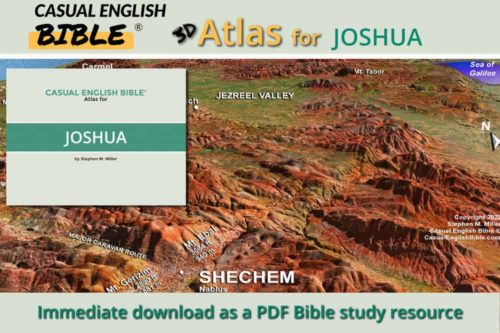Joshua 16
Real estate for Ephraim’s tribe
Two tribes for Joseph
1Joseph’s two tribes [1] got land that started along the west bank of the Jordan River. Jericho was destroyed, but the Jericho oasis with its springs, sat near the southeast corner of the two tribal territories. The southern boundary climbed the hills west of Jericho and continued to Bethel. 2From Bethel, a town also known as Luz, [2] the boundary pushed across the land of Ataroth, [3] where the Arkite people lived. 3The southern boundary continued over the hills in the west. Then it dropped into the territory of people called Japhletites. It continued toward Lower Beth Horon, moved on to Gezer. It ended at the Mediterranean Sea. 4So, the descendants of Joseph’s sons, Manasseh and Ephraim, got their share of land.Manasseh’s boundaries
5Here’s the land assigned to Ephraim’s tribe.Part of the southern boundary started in the east at Ataroth-addar. It reached as far as Beth Horon. 6Then it continued to the Mediterranean Sea. The northern boundary ran from Michmethath eastward to Taanath Shiloh and on to the east side of Janoah. 7From Janoah, it descended to Ataroth and Naarath. Then it brushed alongside the Jericho oasis and continued to the Jordan River. 8At Tappuah, the boundary ran west to Dry Creek Kanah, [4] then on to the Mediterranean Sea. 9Israelite leaders also gave Ephraim some towns and outlying settlements inside Manasseh’s borders. 10Ephraim’s fighting men didn’t capture the city of Gezer. Today, Canaanites in Gezer work as slaves for the people of Ephraim.
Footnotes
Jacob was the father of the 12 men whose families grew into what became the 12 tribes of Israel. When Jacob, living in Egypt, realized he was dying, he called in his sons to bless them. He also blessed Joseph’s two sons, Ephraim and Manasseh. Even better, he adopted them as his own sons. He promised them land in what is now Israel and Palestinian Territories—shares equal to what Jacob’s other sons would inherit (Genesis 48:5-20). Half the tribe of Manasseh settled east of the Jordan River. The other half, along with Ephraim, settled west of the river, in a prime stretch of land that extended to the Mediterranean Sea.
It’s “from Bethel to Luz” in an ancient Jewish translation of the Bible. Jewish scholars translated their Hebrew Bible into Greek, which had become an international language of the day. The translation was called the Septuagint, a project started more than 2,000 years ago, before the birth of Jesus.
Two contenders for the location: Atara and Khirbet ed-Darieh.
Literally “Wadi Kanah,” also called Nahal Qana. A wadi is a normally dry pathway that can become a river during a flash flood or in the rainy season of winter in what is now Israel and Palestinian Territories.
Discussion Questions
- Sorry, there are currently no questions for this chapter.







